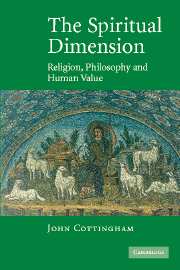Book contents
- Frontmatter
- Contents
- Preface and acknowledgements
- 1 Religion and spirituality: from praxis to belief
- 2 Religion and science: theodicy in an imperfect universe
- 3 Religion and value: the problem of heteronomy
- 4 Religion and self-discovery: the interior journey
- 5 Religion and language: emotion, symbol, and fact
- 6 Religion and the Enlightenment: modernist and postmodernist obstacles
- 7 Religion and the good life: the epistemic and moral resources of spirituality
- 8 Religion and pluralism: which spirituality?
- Bibliography
- Index
8 - Religion and pluralism: which spirituality?
Published online by Cambridge University Press: 24 November 2009
- Frontmatter
- Contents
- Preface and acknowledgements
- 1 Religion and spirituality: from praxis to belief
- 2 Religion and science: theodicy in an imperfect universe
- 3 Religion and value: the problem of heteronomy
- 4 Religion and self-discovery: the interior journey
- 5 Religion and language: emotion, symbol, and fact
- 6 Religion and the Enlightenment: modernist and postmodernist obstacles
- 7 Religion and the good life: the epistemic and moral resources of spirituality
- 8 Religion and pluralism: which spirituality?
- Bibliography
- Index
Summary
This is not a book of separated philosophy, separated from faith, and separated from concrete life. I believe, on the contrary, that philosophy attains its aims, particularly in practical matters, only when vitally united with every source of light and experience in the human mind. Thus it becomes able, in its own intellectual domain, to ransom the time, and to redeem every human search after truth, however it wanders, in manifold, even opposite ways.
Jacques Maritain.RECAPITULATION
In pausing before the final phase of a journey, it may be helpful to reflect briefly on the steps taken so far. I have been underlining in a number of ways the role of the spiritual dimension – the central importance of structured programmes of moral and personal askesis – for understanding what it means to adhere to a religion. Spiritual praxis, it has been argued, is prior to metaphysical doctrine in various important respects. In the first place, it is temporally prior, because as with any process of acculturation, we characteristically begin the long process of learning and adaptation before we are in a position to scrutinize the theoretical basis of what we are taught. In the second place, it is heuristically prior, prior in the order of discovery, because religion is one of many important areas of human experience where personal involvement scores over impersonal detachment in the way it facilitates understanding: just as the detached scrutiny that is appropriate for science will not work in personal relationships, so in the religious domain we can often be blocked from grasping the salient features unless a certain degree of receptivity and openness is already present.
- Type
- Chapter
- Information
- The Spiritual DimensionReligion, Philosophy and Human Value, pp. 150 - 172Publisher: Cambridge University PressPrint publication year: 2005

